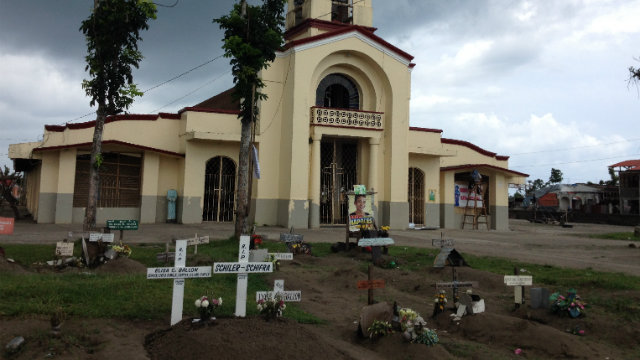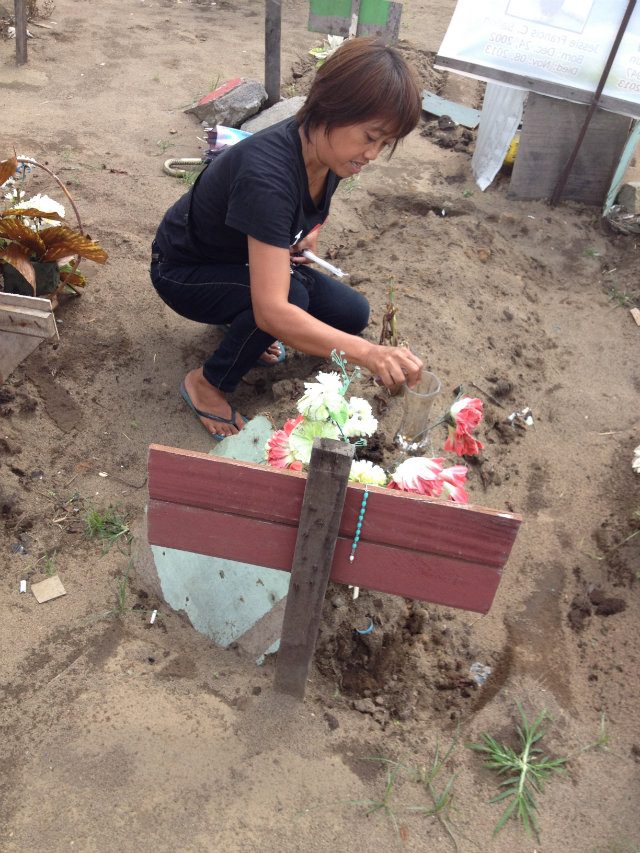SUMMARY
This is AI generated summarization, which may have errors. For context, always refer to the full article.

MANILA, Philippines – She was holding a bunch of candles as she walked tentatively towards the graveyard in front of San Joaquin Catholic Church. I immediately assumed she was visiting someone among the countless who were buried hastily a day after typhoon Haiyan (Yolanda) mercilessly struck the town of Palo in Leyte province.
According to history, Palo was established in the 16th century and was once Leyte’s capital town before Tacloban City. Named after its patron saint, San Joaquin village is located 15 km south of Tacloban and has suffered the destructive onslaught of typhoon Yolanda/Haiyan, leaving countless people dead.
When I asked who she was visiting, she said, “My husband David and my mother-in-law Tarcela.” Her eyes were moist, trying to defy the pain she was reeling from.
I marveled at her steady gaze. This one’s a very strong woman, I thought. Her name is Maricel Escaro, 44 years old and a mother of three children ages 10, 6, and 4.
She was very gracious and nodded readily when I asked if she could tell me her story. She smiled wanly.
Her story
After a long pause, she said the day the typhoon landed in San Joaquin, her husband hastily sent them to safety in their neighbor’s house and ran back to fetch his 83-year-old mother Tarcela who was alone at home. He never came back.
Maricel distinctly remembered the winds were howling around them. “We were very scared. It looked black around us and we could hardly see anything.”
Her 52-year-old husband and mother-in-law were found dead on the road, along with countless other bodies, many of them she knew, when the typhoon left. Their house was totally destroyed. Nothing was saved.

The tears started coming when her friend Vilma beside her described David as a devoted and hard-working husband. Vilma said, “he would do house chores and doesn’t mind doing laundry and cooking. A very good man.”
For a while we ran out of words to say and kept quiet. We allowed Maricel a time for her grief, tinkering at the candles she earlier lit. (READ: Endless torment for woman widowed by Haiyan)
Standing alone
“We have a small store and my husband took care of everything. We all depended on him,” Maricel said to me.
She added that she realized women should learn to stand on their own and earn their own income while their husbands are alive.
When he died, she was left with no choice but to pick up the pieces. She started a small business – selling dried fish to neighbors. Maricel brought her small children to her parents in Hilongos, a nearby town, so she could work.
All I needed was to look into her eyes to know that life is extremely difficult as a widow. The pain was all there – as well as all the uncertainty of their future.
The San Joaquin Catholic Church graciously agreed to convert its front yard into a graveyard when dead bodies started to line the road. Even the small fork on the road was also made into a burial place so people could have peace of mind laying their loved ones to rest. (READ: After Haiyan: No man left behind)
Picking up the pieces
When the typhoon settled and she saw all the destruction around her, Maricel’s first thought was how to move on. “I do not know where to begin. Everything looked bleak. I learned late that we need to take typhoon warnings seriously. When we decided … it was too late.”
I was just reassured by Maricel’s words in a whisper. “Babangon po kami (We will rise up from this),” she said as the tears stopped. (READ: Small smiles for Tacloban’s children)
It was raining hard when we left. Maricel and Vilma hurried home with their umbrellas. It must be tough enduring the bad weather that reminds them how a typhoon changed their lives in a day. Some lessons we take for granted could bring scars that would mar our lives forever. – Rappler.com
Cecile Laguardia is Communications Manager of World Vision‘s Haiyan Emergency Response shuttling between Cebu, Ormoc, and Tacloban.
Add a comment
How does this make you feel?
There are no comments yet. Add your comment to start the conversation.